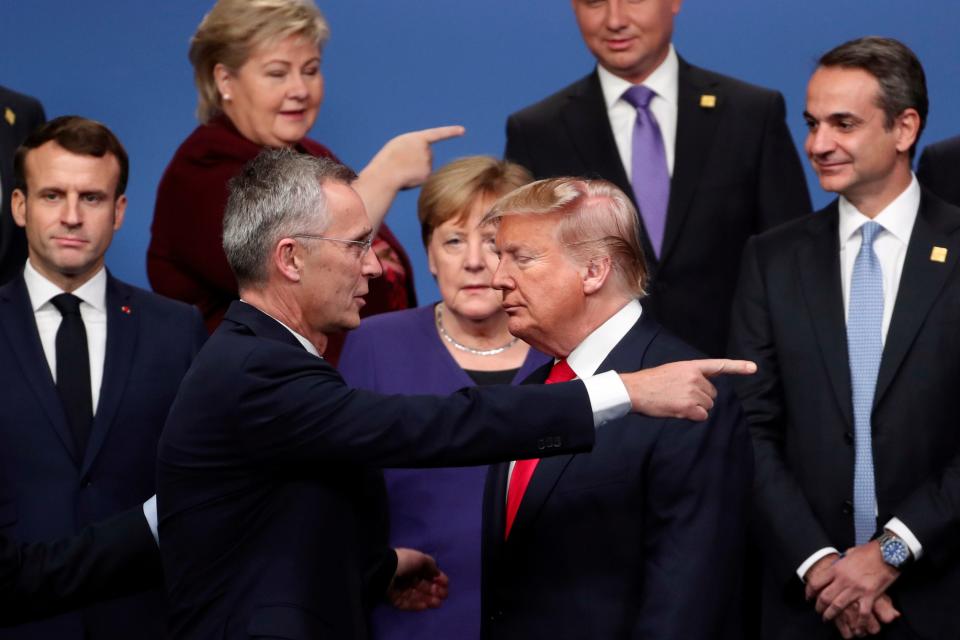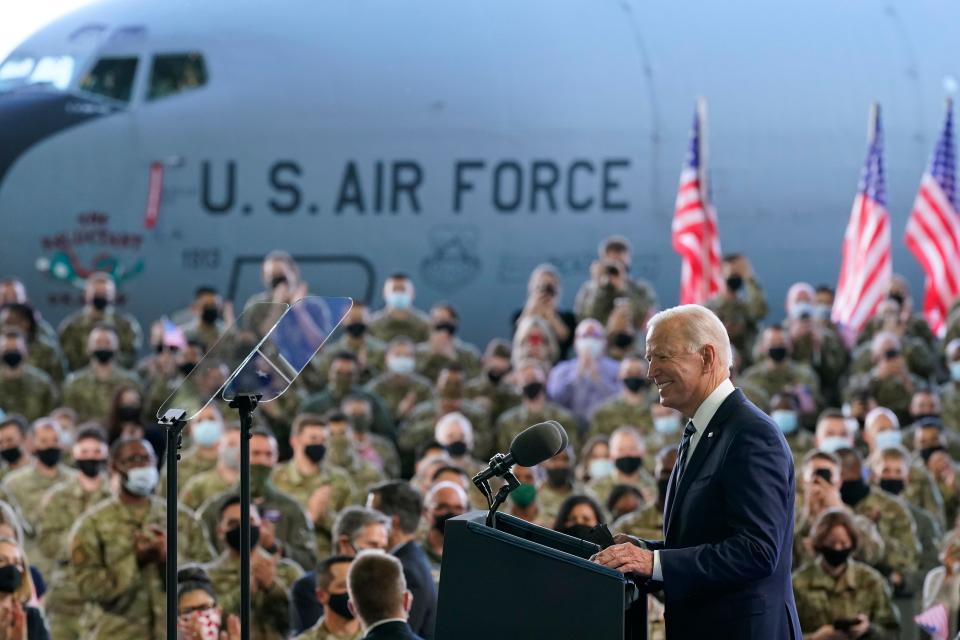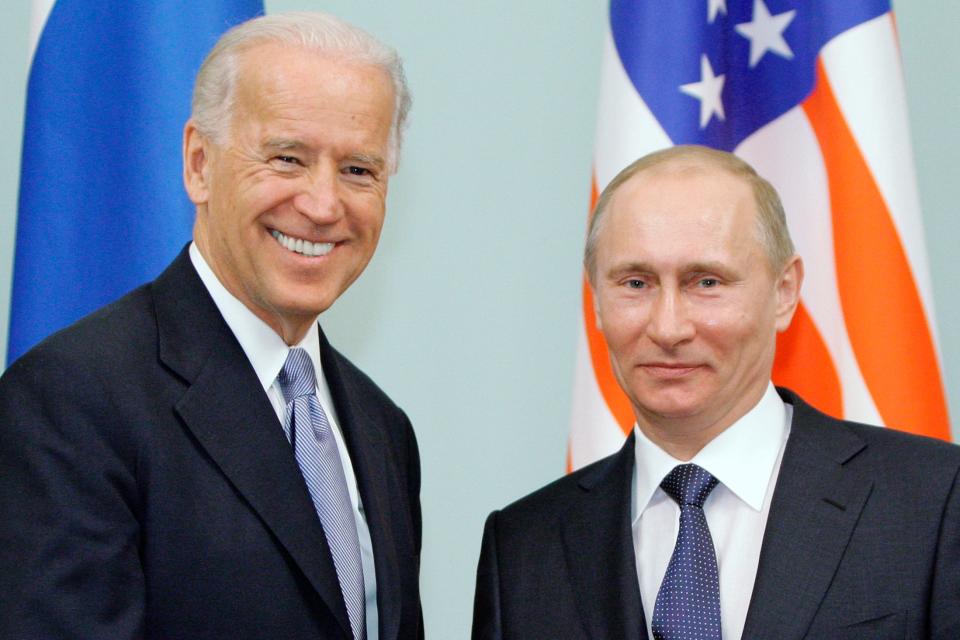Joe Biden points to G-7 summit, NATO, Putin meeting as 'defining' moment for democracy
- Oops!Something went wrong.Please try again later.
- Oops!Something went wrong.Please try again later.
- Oops!Something went wrong.Please try again later.
FALMOUTH, England – At what President Joe Biden calls a "defining" time for democracy, he makes his first international trip for the G-7 summit with a packed agenda.
Among the highlights: getting the global economy back on track in the wake of the coronavirus pandemic that is still firmly entrenched in most parts of the world; climate change; defense and security; and easier – though no less important – talking about the solidarity, multilateralism and shared democratic values that many close European allies felt had all but vanished under former President Donald Trump's administration.
"This is a defining question of our time: Can democracies come together to deliver real results for our people in a rapidly changing world? Will the democratic alliances and institutions that shaped so much of the last century prove their capacity against modern-day threats and adversaries? I believe the answer is yes. And this week in Europe, we have the chance to prove it," Biden wrote in a Washington Post op-ed.
Biden will participate in the in the G-7 summit in Cornwall, England, NATO in Brussels, followed by a highly anticipated meeting with Russian President Vladimir Putin, a leader he actively dislikes, in Geneva.
Biden will announce that the U.S. will purchase and donate 500 million doses of Pfizer’s COVID-19 vaccine to 92 low and lower middle-income countries and the African Union. The shots will be distributed through the global vaccine alliance known as COVAX, with 200 million to be shared this year and the remaining 300 million to be donated through the first half of 2022.
He's not Donald Trump
It's not an exaggeration to say that Trump often sowed chaos at international summits. He stormed out of a G-7 summit in Canada in 2018, routinely accused NATO of leeching off the U.S., cozied up to authoritarian leaders and insulted the European Union.
Trump's critics say: He may have gotten some world affairs right

Still, Brett Bruen, a former diplomat in the Obama administration and now president of Global Situation Room, a crisis and reputation management firm based in Washington, said that Biden heads overseas "as the glow and goodwill generated by his ascension to presidency begins to fade globally." Bruen said world leaders "are feeling frustrated by the often detached diplomacy he has practiced over his first months in office."
Bruen cited Biden's decision to push ahead with withdrawing all U.S. troops from Afghanistan by Sept. 11 despite concerns the move could embolden an already resurgent Taliban, and his administration's relatively meek initial response to renewed fighting last month between Israelis and Palestinians in the Gaza Strip.
US aid to Israel was always a given: Will more support for Palestinians change that?
"His priority appears placed on disengagement and diminishing American involvement in challenging international issues. Meanwhile, he seems fiercely focused on domestic concerns and considerations. This is likely to be a source of some friction," Bruen said.
There is also concern, said Rachel Ellehuus, a former Pentagon official, about what could happen if Biden turns out to be a one-term president.
"They worry that some of the negative language about allies and partners and the U.S. commitment to NATO and global leadership could falter again," she said.
But Charles Kupchan, a senior fellow at the Council on Foreign Relations think tank in New York, said Biden has gotten off to a good start on the world stage. He pointed to Biden's move to rejoin the Paris climate agreement from which Trump withdrew and ongoing indirect negotiations with Iran for a full resumption of the nuclear accord.
"He has a lot of wind in his sails just by being Joe Biden, and not Donald Trump. Many governments and leaders around the world are breathing massive sighs of relief to have someone more familiar and more trusted in the White House," Kupchan said.
China looms large
The G-7 leaders of the world's seven wealthy industrialized nations were set to meet in June last year at Camp David, the presidential retreat in Maryland, but the coronavirus outbreak hobbled those plans. The June 11-13 make-up summit in Carbis Bay, Cornwall, a region on the tip of southwestern England noted for its wild coastal scenery, will be the leaders' first face-to-face meeting in more than two years.
Kupchan said the G-7 summit will be a "reunion of sorts" and a "kind of coming-out party for the Biden presidency." He said he expects G-7 leaders to make concrete progress with plans to share more coronavirus vaccines with nations that have fragile and under-resourced health systems. He foresaw some action to tackle a paucity of global regulation around cryptocurrencies and other digital assets, and perhaps the beginnings of an attempt to "forge a common position on China."
Beijing is an economic colossus.
Its technological capabilities combined with its growing geopolitical assertiveness and military prowess mean China is viewed by many Western countries as the major, if not most serious, national security threat that they will likely face for decades to come.
But Kupchan cautioned that while the G-7 forum is increasingly being used to address geopolitical concerns, its chief remit is economic and monetary matters. And while Biden's return to the confab is being welcomed, this doesn't mean the summit's "atmospherics" or "deliverables" will be entirely positive or a foregone conclusion.
"There are divisions within Europe and across the Atlantic about how best to cope with the rise of China, so when Biden says he wants to build a united front of democracies to stand up to China: He's right. We do need that. But it's not going to be easy to (accomplish) consensus across the many issues at play."
'Shift the strategic center of gravity'
A British official not authorized to speak publicly about the G-7 summit said the meeting, as is typical of global summits of this kind, would likely be dominated publicly by "live events" – whatever's grabbing foreign affairs headlines that day or week, whether in Myanmar, Belarus or Russian cyberattacks or aggressions in Ukraine.
But the official added that the summit was a genuine opportunity to "shift the strategic center of gravity" longer term on various global issues ranging from improving girls' access to education to agreeing on minimum international corporate tax rates.
G-7 finance ministers who met ahead of the summit said they had already agreed on a landmark deal that would see a minimum rate of corporation tax of at least 15% placed on multinational companies, including tech giants like Amazon, Apple and Microsoft.
G-7: 15% global minimum corporate tax rate, more taxes for tech giants
Biden and other leaders in Cornwall are expected to sign off on the proposal that would make sure corporations pay taxes in the countries where they sell products and services, not just where they decide to base their operations. The move sits well with Biden's domestic pledge to spend more on social safety net programs and infrastructure and make America's wealthiest individuals and businesses help pay for it.
Biden has said again and again that he views a strong middle class as a prerequisite for a stable democracy and that the tax move bolsters one of the central planks of his proposed foreign policy: to connect the fortunes of Americans at home to U.S. action abroad.
The British official said the G-7 meeting was an opportunity to "reinvigorate international action" after a few years of relative stalemate because of the coronavirus pandemic.
"It's about how we make the recovery out of COVID work for people in all our countries ... and how we shape those plans in a way that allows us to tackle the big political trends ... in a way that reflects our values as open societies," the official said.
On Thursday, Biden meets with British Prime Minister Boris Johnson, where he will raise the question of how Brexit, the U.K.'s withdrawal from the European Union, could affect the Good Friday Agreement, the peace deal in Northern Ireland. Northern Ireland is part of the U.K. but Ireland is not. It's in the EU. Borderless trade across the EU political bloc has partially underwritten stability on the Irish border for several decades.
Pushing NATO allies on defense spending?
One place where U.S. and European divisions may arise is Brussels, where Biden will attend the NATO meeting June 14.
When Trump visited the military alliance's headquarters in Belgium in May 2017, he did his best to harangue allies and avoid explicitly recommitting to Article 5, the principle of mutual defense that is the bedrock of the transatlantic military alliance.
Biden will almost certainly unequivocally reaffirm the integrity and solidity of the NATO alliance and American security guarantee, but he won't be able to paper over a longstanding crack: More NATO countries still need to increase their military spending to meet the alliance's agreed spending targets of 2% of economic output.

'A reckoning is near': U.S. has a vast overseas military empire. Does it still need it?
According to the latest NATO estimates, just 11 of 30 countries do.
"The optics of no Trump presence (in Brussels) will be interesting to observe. Clearly, Europeans disliked his coercive approach and unstatesmanlike rhetoric," said Andris Banka, a Latvian-born professor of international politics at the University of Greifswald in Germany. "That said, I think Europeans will be pressed further to meet the 2% (defense spending) goal, this time arguably by the most trans-atlanticist U.S. president."
The U.S. also wants NATO to more actively push back against Russia's activities in Ukraine as well as its use of cyber warfare and disinformation.
"Every time you listen to NATO talk about cyber, it's cyberdefense, defend, increase our defense, thicken our defense, do some more defense. The fact of the matter is, what's not being talked about is imposing costs on Russia. Why would Russia change its behavior if there is no cost to it for its behavior?" asked Philip M. Breedlove, a retired four-star general in the U.S. Air Force who also served as NATO's Supreme Allied Commander for Europe from 2013-2016. "What we don't talk about in NATO is cyber offense. ... Let's talk about just imposing costs on Russia for its intransigence in the cyber domain."
Most 'contentious' for last: Putin
Biden's final stop may be his most challenging: a one-on-one with Putin.
The two leaders have long circled each other warily, and Biden will arrive in Switzerland with a long list of grievances, from alleged Russian-backed hacking to Moscow's crackdown on domestic political opponents and its support for those who do the same elsewhere, whether in Syria or in neighboring Belarus.

For his part, Putin will likely demand the U.S. stay out of what Putin sees as Russia's legitimate activities in Ukraine.
Biden and Putin have not met in person since the former became president. But they have history. During an election fundraiser in New York in 2019, Biden spoke of meeting with Putin while he was vice president during the Obama administration.
"I don’t think you have a soul," Biden recalled saying to Putin. The Russian president's response was, according to Biden, 'Well, we understand each other.'"
More recently, in March, Putin wished Biden "good health" after the U.S. leader assented to a description of his Russian counterpart as a "killer" during an interview.
Jake Sullivan, Biden's national security adviser, said in a White House briefing about Biden's trip that the U.S.-Russia relationship is not one based on trust.
"It's about a relationship of verification. It's about a relationship of clarifying what our expectations are and laying out that if certain kinds of harmful activities continue to occur, there will be responses from the United States."
Alexander Vershbow, a former U.S. ambassador to Russia and former NATO deputy secretary general, put it a differently: The Putin summit "is going to be a very contentious one," he said. "Biden made clear early on that there's a new sheriff in town."
This article originally appeared on USA TODAY: Biden to meet with G-7, NATO allies at 'defining' moment for democracy

